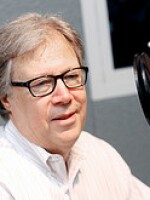Leonard Bernstein’s ghost has hung discreetly around the grounds of Tanglewood for the past 28 years, ever since the maestro died in the fall of 1990.
This summer, Lenny’s ghost will pretty much have the run of the place.
Bernstein would have turned 100 on August 25. To observe the occasion, the Boston Symphony Orchestra is basically turning this Tanglewood season into an eight-week running birthday party.
Beginning on the BSO’s opening weekend in early July, and continuing through the next-to-last concert of the season in late August, Bernstein will be toasted, celebrated, remembered -- and mainly, performed.
I’ll point out some of the season’s musical highlights in a moment, but first, a quick summary of the Bernstein/Tanglewood relationship:
In 1940, a 21-year-old Bernstein – having just completed his first year of graduate school at the Curtis Institute – applied to become a member the inaugural conducting class at Tanglewood. The institution itself was in its infancy, having just been created a couple of years earlier as the official summer home of the BSO, as well as a training ground for aspiring musicians. The conducting program, such as it was, consisted mainly of personal lessons from the orchestra’s cheerfully autocratic music director, the Russian Serge Koussevitzky.
Koussevitzky immediately recognized the specialness of his young student. He appointed himself Bernstein’s personal mentor and career counselor, roles he would continue to play until his death a decade later. Bernstein evidently progressed rapidly: two years after being accepted as a student here, he was appointed to the Tanglewood conducting faculty.
For the next 50 years, his fame and artistic stature steadily advancing, Bernstein nevertheless remained an annual presence at Tanglewood – mentoring generations of young hopefuls and typically conducting the BSO in a high-energy performance or two.
In 1988, Tanglewood threw Bernstein an elaborate three-day 70th birthday bash, the centerpiece of which was a raucous talent show, with the talent including such far-flung Bernstein pals as Beverly Sills, Quincy Jones, Yo-Yo Ma, Bobby McFerrin, Mstislav Rostropovich, Lauren Bacall, and a few dozen others. The honoree sat out in the middle of the shed, beaming. The evening set a record for most air kisses blown to and from a major classical music figure.
Alas, just two years later, Tanglewood provided the somber backdrop for what turned out to be Bernstein’s last public performance.
On a drizzly Sunday afternoon in August of 1990, a frail and clearly laboring Bernstein – his health undone by a lifetime of cigarettes, distilled spirits and various inadvisable lifestyle choices – gutted out a performance of Britten’s Four Sea Interludes, followed by Beethoven’s Seventh Symphony.
During the symphony, Bernstein repeatedly drew a red handkerchief from his pocket and coughed alarmingly into it. At a couple of points, he grabbed the podium rail behind him with both hands, leaving the musicians to follow the maestro’s head feints as best they could.
Six weeks later he was dead.
The Bernstein/Tanglewood story had come full circle: the exuberant, loose-limbed young wunderkind who had gotten his start at this grassy suburban retreat had, a half-century later and by this time a silver-haired lion of the classical music universe, given his final earthly performance on this very same open-air stage.
The upcoming Tanglewood season – the official moniker is the Bernstein Centennial Summer – will feature nearly every significant work he composed, with the exception of a couple of his symphonies (they were performed in Boston this past season at Symphony Hall), and his ever-troublesome 1971 Mass, which was evidently judged, not unreasonably, to be just too huge and too weird to be offered in its entirety, although excerpts will be heard.
Here, then, are the selected highlights of this once-in-a-century celebration:
To get things rolling, on July 7, the Boston Pops, with a full company of singers and dancers, will present Bernstein’s 1944 musical On the Town.
Later in July will come a fully-staged production of Bernstein’s dated but hard to resist little one-act opera, Trouble in Tahiti; a performance of Bernstein’s enduring (and unrepentantly tuneful) choral piece, Chichester Psalms; and a showing of the classic 1962 film version of West Side Story, accompanied live and in real time by the BSO. David Newman, a brave man, conducts.
Among the August programs will be a specially written Young People’s Concert hosted by Bernstein’s daughter Jamie, a fully choreographed presentation of the Bernstein/Jerome Robbins ballet Fancy Free, and two performances of Bernstein’s charming if not surpassingly coherent operetta Candide, featuring the protean instrumental ensemble The Knights, and a cast of many singers and dancers.
To wrap up the party, on August 25 – his actual hundredth birthday -- the BSO will pull out all the stops for an evening that gets its own name: The Bernstein Centennial Celebration at Tanglewood.
This will be another all-star event, the stars being, among others, Audra McDonald, Yo-Yo Ma, baritone Thomas Hampson, and no fewer than five conductors, including the very hard-working BSO music director Andris Nelsons, Pops conductor Keith Lockhart and former Pops conductor John Williams.
Also on hand will be violinist Midori, who figured prominently in a now-immortal Bernstein/Tanglewood moment, when, as a 14-year-old she broke not one but two strings during a performance of Lenny’s “Serenade.” When the piece was over, with the cheering crowd on its feet, a disbelieving Bernstein jumped off the podium and tearfully embraced the teenaged soloist.
And in an inspired piece of programming, the evening will conclude will the thunderous final movement of the Symphony No. 2 (“Resurrection”) of Mahler, the composer Bernstein was most closely associated throughout his life.
This, of course, is just a quick summary. For the full roster of Tanglewood offerings, including the start times and venues, as well as information on the many upcoming concerts with no Bernstein connection, visit their website.





